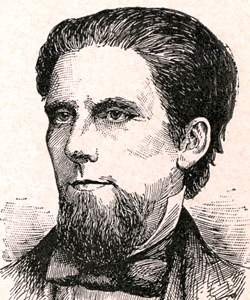Jabez Curry (American National Biography)
Scholarship
Although he had defended slavery as an Alabama Congressman and had served the Confederacy, Curry spent much of his later years as an advocate of education for freed slaves and spoke out against lynching. As agent for the Peabody Fund, he threatened to deny support to Southern communities that refused to educate their black children on the ground that blacks paid little or nothing in taxes. His advocacy, however, was carefully couched and calibrated not to offend either the white Southern aristocracy to which he belonged or the Northern philanthropists who sponsored his activities. He knew Booker T. Washington and was a firm advocate of the industrial education that Washington had learned at Hampton Institute in Virginia and pioneered at Tuskegee Institute in Alabama.
Personally, Curry thought that enfranchisement of African Americans after emancipation had been a mistake, and he believed that there were firm limits to what the black race could accomplish, even with increased educational privileges. Thus, although Curry worked assiduously for the education of freed slaves, he was firm in his commitment to continued segregation in schools. He never advocated biracial education, and this almost certainly reflected his own personal views as well as the desires of the white aristocracy of North and South. Thus, Curry's reputation as an educational reformer was well earned but also subject to the distinct limits that he and his sponsors put on the achievement of the freed people.
Personally, Curry thought that enfranchisement of African Americans after emancipation had been a mistake, and he believed that there were firm limits to what the black race could accomplish, even with increased educational privileges. Thus, although Curry worked assiduously for the education of freed slaves, he was firm in his commitment to continued segregation in schools. He never advocated biracial education, and this almost certainly reflected his own personal views as well as the desires of the white aristocracy of North and South. Thus, Curry's reputation as an educational reformer was well earned but also subject to the distinct limits that he and his sponsors put on the achievement of the freed people.
Wayne Urban, "Curry, Jabez Lamar Monroe," American National Biography Online, February 2000, http://www.anb.org/articles/09/09-00215.html.
Jabez Curry (Congressional Biographical Directory)
Reference
CURRY, Jabez Lamar Monroe, a Representative from Alabama; born near Double Branches, Lincoln County, Ga., June 5, 1825; moved with his father to Talladega County, Ala., in 1838; was graduated from the University of Georgia at Athens in 1843; studied law at Harvard University; was admitted to the bar and commenced practice in Talladega County in 1845; served in the war with Mexico as a private in the Texas Rangers in 1846, but resigned because of ill health; member of the State house of representatives in 1847, 1853, and 1855; elected as a Democrat to the Thirty-fifth and Thirty-sixth Congresses and served from March 4, 1857, to January 21, 1861, when he withdrew; deputy from Alabama to the Provisional Confederate Congress and a Representative in the First Confederate Congress; during the Civil War served as lieutenant colonel of Cavalry in the Confederate Army; after the war became a Baptist preacher; chosen president of Howard College, Alabama, in 1865; professor in Richmond College, Virginia, 1868-1881; agent of the Peabody and States Funds from 1881 until his death; appointed Envoy Extraordinary and Minister Plenipotentiary to Spain on October 7, 1885, and served until August 6, 1888, when he resigned; appointed Ambassador Extraordinary on special mission to Spain (the coming of age of the King) February 3, 1902; died in Victoria, near Asheville, N.C., February 12, 1903; interment in Hollywood Cemetery, Richmond, Va.
“Curry, Jabez Lamar Monroe,” Biographical Directory of the United States Congress, 1774 to Present, http://bioguide.congress.gov/scripts/biodisplay.pl?index=C001003.



